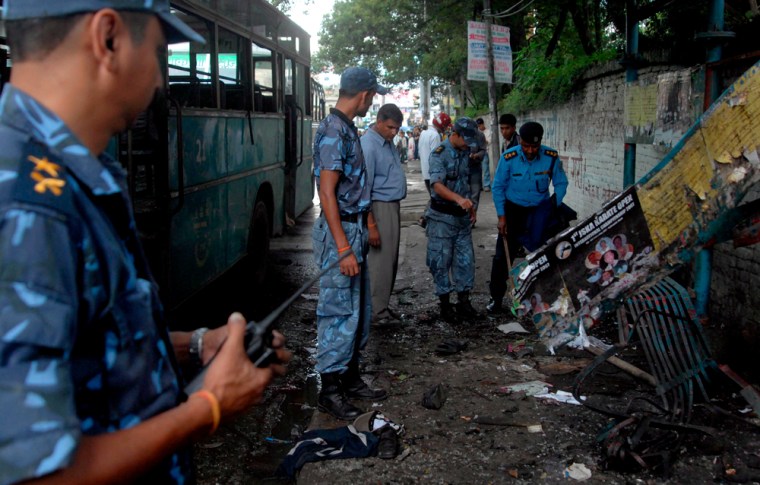Four bombs exploded almost simultaneously in and around Nepal's capital Sunday, killing at least two people in the first attack on Katmandu since a communist insurgency ended last year, authorities said.
There was no immediate claim of responsibility for the blasts, two of which struck near the headquarters of Nepal's army. But suspicion quickly fell on the nearly half a dozen armed groups, all of them ethnic-based, operating in southern Nepal.
Apart from the two deaths, the bombs also wounded at least 13 people, seven of whom were hospitalized in a critical condition, said a spokesman for Nepal's Home Ministry, Baman Prasad Neupane.
The most powerful of the bombs appeared to be the one that exploded inside a moving bus about 1,000 feet from the army headquarters in Katmandu at around 4 p.m.
An eyewitness, Ravin Shrestha, said the force of the blast momentarily lifted the bus off the ground. At least one schoolgirl, who was standing at a nearby bus stop, was killed in the explosion.
Another blast occurred minutes later along a nearby roadside, said Basu Nepal, a police officer.
Two more blasts took place on the outskirts of the city — one in the district of Balaju, which killed one person, and the other near Tribhuvan University in Kirtipur, about 8 miles southwest of Katmandu, Nepal said.
Tug-of-war with rebels
Despite the ongoing peace process with the Maoist rebels, who last year joined the government after a decade of fighting, there have been repeated outbreaks of violence in southern Nepal over the past year with at least 60 people killed in clashes between security forces and ethnic minority groups who say their region has been sidelined in favor of the more populated, mountainous north.
The groups, who want greater autonomy, more seats in the national legislature and a guaranteed number of representatives in the administration, have pressed their demands through strikes, transportation shutdowns and demonstrations.
Nepal's government reached a peace agreement on Thursday with one of the major ethnic groups fighting in the south, the Madhesi People's Rights Forum.
But a Home Ministry official, Ek Mani Nepal, warned last month that a half dozen armed groups were still operating in the region.
The government is trying to settle the conflicts with all the groups so that elections can be held in November for a special assembly that will draft a new constitution.
Rewriting the constitution was a key demand of the tens of thousands of protesters who repeatedly took to the streets in April 2006 demanding an end to the royal dictatorship of King Gyanendra.
The king seized absolute power a year earlier, saying he would bring order to a chaotic political scene and quell the communist insurgency, which killed nearly 13,000 people.
But the insurgency worsened, the economy faltered, and Gyanendra's heavy-handed tactics helped forge an alliance between the usurped political elite and communists. By April 2006, widespread discontent erupted into mass protests that forced Gyanendra to cede power.
Gyanendra was soon after stripped of all his power by an interim parliament, which is governing the country until the special assembly is elected. The assembly will decide on what, if any, role the monarchy should have when it writes the new constitution.
